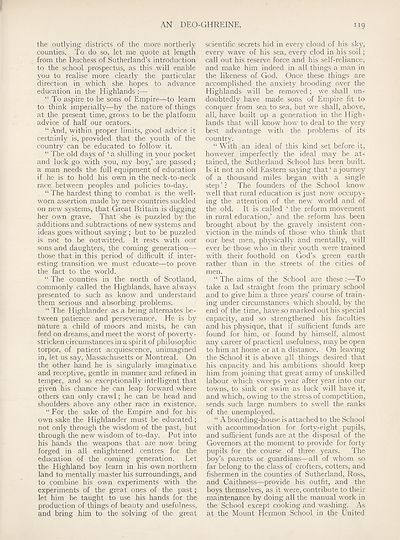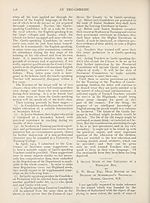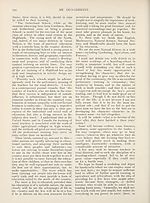An Comunn Gàidhealach Publications > Deo-gréine > Volume 1, October 1905-September 1906
(139) Page 119
Download files
Complete book:
Individual page:
Thumbnail gallery: Grid view | List view

AN DEO-GHREINE.
l9
the outlying districts of the more northerly
counties. To do. so, let me quote at length
from the Duchess of Sutherland’s introduction
to the school prospectus, as this will enable
you to realise more clearly the particular
direction in which she hopes to advance
education in the Highlands :—
“ To aspire to be sons of Empire—to learn
to think imperially-—by the nature of things
at the present time, grows to be the platform
advice of half our orators.
“ And, within proper limits, good advice it
certainly is, provided that the youth of the
country can be educated to follow it.
“ The old days of ‘ a shilling in your pocket
and luck go with you, my boy,’ are passed;
a man needs the full equipment of education
if he is to hold his own in the neck-to-neck
race between peoples and policies to-day.
“ The hardest thing to combat is the well-
worn assertion made by new countries suckled
on new systems, that Great Britain is digging
her own grave. That she is puzzled by the
additions and subtractions of new systems and
ideas goes without saying ; but to be puzzled
is not to be outwitted. It rests with our
sons and daughters, the coming generation—
those that in this period of difficult if inter¬
esting transition we must educate—to prove
the fact to the world.
“ The counties in the north of Scotland,
commonly called the Highlands, have always
presented to such as know and understand
them serious and absorbing problems.
“ The Highlander as a being alternates be¬
tween patience and perseverance. He is by
nature a child of moors and mists, he can
feed on dreams, and meet the worst of poverty-
stricken circumstances in a spirit of philosophic
torpor, of patient acquiescence, unimagined
in, let us say, Massachusetts or Montreal. On
the other hand he is singularly imaginative
and receptive, gentle in manner and refined in
temper, and so exceptionally intelligent that
given his chance he can leap forward where
others can only crawl; he can be head and
shoulders above any other race in existence.
“ For the sake of the Empire and for his
own sake the Highlander must be educated ;
not only through the wisdom of the past, but
through the new wisdom of to-day. Put into
his hands the weapons that are now being
forged in all enlightened centres for the
education of the coming generation. Let
the Highland boy learn in his own northern
land to mentally master his surroundings, and
to combine his own experiments with the
experiments of the great ones of the past ;
let him be taught to use his hands for the
production of things of beauty and usefulness,
and bring him to the solving of the great
scientific secrets hid in every cloud of his sky,
every wave of his sea, every clod in his soil;
call out his reserve force and his self-reliance,
and make him indeed in all things a man in
the likeness of God. Once these things are
accomplished the anxiety brooding over the
Highlands will be removed; we shall un¬
doubtedly have made sons of Empire fit to
conquer from sea to sea, but we shall, above,
all, have built up a generation in the High¬
lands that will know how to deal to the very
best advantage with the problems of its
country.
“ With an ideal of this kind set before it,
however imperfectly the ideal may be at¬
tained, the Sutherland School has been built.
Is it not an old Eastern saying that ‘ a journey
of a thousand miles began with a single
step ’ ? The founders of the School know
well that rural education is just now occupy¬
ing the attention of the new world and of
the old. It is called ‘ the reform movement
in rural education,’ and the reform has been
brought about by the gravely insistent con¬
viction in the minds of those who think that
our best men, physically and mentally, will
ever be those who in their youth were trained
with their foothold on God’s green earth
rather than in the streets of the cities of
men.
“ The aims of the School are these :—To
take a lad straight from the primary school
and to give him a three years’ course of train¬
ing under circumstances which should, by the
end of the time, have so marked out his special
capacity, and so strengthened his faculties
and his physique, that if sufficient funds are
found for him, or found by himself, almost
any career of practical usefulness, may be open
to him at home or at a distance. On leaving
the School it is above §dl things desired that
his capacity and his ambitions should keep
him from joining that great army of unskilled
labour which sweeps year after year into our
towns, to sink or swim as luck will have it,
and which, owing to the stress of competition,
sends such large numbers to swell the ranks
of the unemployed.
“ A boarding-house is attached to the School
with accommodation for forty-eight pupils,
and sufficient funds are at the disposal of the
Governors at the moment to provide for forty
pupils for the course of three years. The
boy’s parents or guardians—all of whom so
far belong to the class of crofters, cotters, and
fishermen in the counties of Sutherland, Ross,
and Caithness—provide his outfit, and the
boys themselves, as it were, contribute to their
maintenance by doing all the manual work in
the School except cooking and washing. As
at the Mount Hermon School in the United
l9
the outlying districts of the more northerly
counties. To do. so, let me quote at length
from the Duchess of Sutherland’s introduction
to the school prospectus, as this will enable
you to realise more clearly the particular
direction in which she hopes to advance
education in the Highlands :—
“ To aspire to be sons of Empire—to learn
to think imperially-—by the nature of things
at the present time, grows to be the platform
advice of half our orators.
“ And, within proper limits, good advice it
certainly is, provided that the youth of the
country can be educated to follow it.
“ The old days of ‘ a shilling in your pocket
and luck go with you, my boy,’ are passed;
a man needs the full equipment of education
if he is to hold his own in the neck-to-neck
race between peoples and policies to-day.
“ The hardest thing to combat is the well-
worn assertion made by new countries suckled
on new systems, that Great Britain is digging
her own grave. That she is puzzled by the
additions and subtractions of new systems and
ideas goes without saying ; but to be puzzled
is not to be outwitted. It rests with our
sons and daughters, the coming generation—
those that in this period of difficult if inter¬
esting transition we must educate—to prove
the fact to the world.
“ The counties in the north of Scotland,
commonly called the Highlands, have always
presented to such as know and understand
them serious and absorbing problems.
“ The Highlander as a being alternates be¬
tween patience and perseverance. He is by
nature a child of moors and mists, he can
feed on dreams, and meet the worst of poverty-
stricken circumstances in a spirit of philosophic
torpor, of patient acquiescence, unimagined
in, let us say, Massachusetts or Montreal. On
the other hand he is singularly imaginative
and receptive, gentle in manner and refined in
temper, and so exceptionally intelligent that
given his chance he can leap forward where
others can only crawl; he can be head and
shoulders above any other race in existence.
“ For the sake of the Empire and for his
own sake the Highlander must be educated ;
not only through the wisdom of the past, but
through the new wisdom of to-day. Put into
his hands the weapons that are now being
forged in all enlightened centres for the
education of the coming generation. Let
the Highland boy learn in his own northern
land to mentally master his surroundings, and
to combine his own experiments with the
experiments of the great ones of the past ;
let him be taught to use his hands for the
production of things of beauty and usefulness,
and bring him to the solving of the great
scientific secrets hid in every cloud of his sky,
every wave of his sea, every clod in his soil;
call out his reserve force and his self-reliance,
and make him indeed in all things a man in
the likeness of God. Once these things are
accomplished the anxiety brooding over the
Highlands will be removed; we shall un¬
doubtedly have made sons of Empire fit to
conquer from sea to sea, but we shall, above,
all, have built up a generation in the High¬
lands that will know how to deal to the very
best advantage with the problems of its
country.
“ With an ideal of this kind set before it,
however imperfectly the ideal may be at¬
tained, the Sutherland School has been built.
Is it not an old Eastern saying that ‘ a journey
of a thousand miles began with a single
step ’ ? The founders of the School know
well that rural education is just now occupy¬
ing the attention of the new world and of
the old. It is called ‘ the reform movement
in rural education,’ and the reform has been
brought about by the gravely insistent con¬
viction in the minds of those who think that
our best men, physically and mentally, will
ever be those who in their youth were trained
with their foothold on God’s green earth
rather than in the streets of the cities of
men.
“ The aims of the School are these :—To
take a lad straight from the primary school
and to give him a three years’ course of train¬
ing under circumstances which should, by the
end of the time, have so marked out his special
capacity, and so strengthened his faculties
and his physique, that if sufficient funds are
found for him, or found by himself, almost
any career of practical usefulness, may be open
to him at home or at a distance. On leaving
the School it is above §dl things desired that
his capacity and his ambitions should keep
him from joining that great army of unskilled
labour which sweeps year after year into our
towns, to sink or swim as luck will have it,
and which, owing to the stress of competition,
sends such large numbers to swell the ranks
of the unemployed.
“ A boarding-house is attached to the School
with accommodation for forty-eight pupils,
and sufficient funds are at the disposal of the
Governors at the moment to provide for forty
pupils for the course of three years. The
boy’s parents or guardians—all of whom so
far belong to the class of crofters, cotters, and
fishermen in the counties of Sutherland, Ross,
and Caithness—provide his outfit, and the
boys themselves, as it were, contribute to their
maintenance by doing all the manual work in
the School except cooking and washing. As
at the Mount Hermon School in the United
Set display mode to:
![]() Universal Viewer |
Universal Viewer | ![]() Mirador |
Large image | Transcription
Mirador |
Large image | Transcription
| An Comunn Gàidhealach > An Comunn Gàidhealach Publications > Deo-gréine > Volume 1, October 1905-September 1906 > (139) Page 119 |
|---|
| Permanent URL | https://digital.nls.uk/125243580 |
|---|
| Description | Leabhar 1, An deicheamh mios 1, 1905 gu Mios Meadhonach an Fhoghair 1906. |
|---|---|
| Attribution and copyright: |
|
| Description | This contains items published by An Comunn, which are not specifically Mòd-related. It includes journals, annual reports and corporate documents, policy statements, educational resources and published plays and literature. It is arranged alphabetically by title. |
|---|
| Description | A collection of over 400 items published by An Comunn Gàidhealach, the organisation which promotes Gaelic language and culture and organises the Royal National Mòd. Dating from 1891 up to the present day, the collection includes journals and newspapers, annual reports, educational materials, national Mòd programmes, published Mòd literature and music. |
|---|---|
| Additional NLS resources: |
|

